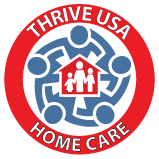Caring for the Caregiver: How to Recognize and Prevent Caregiver Burnout
Being a family caregiver is one of life’s most meaningful roles, but it’s also one of the most challenging. Whether you’re caring for an aging parent in Bethesda, supporting a spouse with dementia in downtown DC, or helping a grandparent in Orlando maintain their independence, the daily demands of caregiving can quietly take their toll on your own well-being.
At Thrive USA Homecare, we see firsthand how dedicated family members pour their hearts into caring for their loved ones, often at the expense of their own health. If you’re feeling overwhelmed, exhausted, or stretched thin, you’re not alone. Caregiver burnout is a real and common experience that affects millions of families across Maryland, DC, and Florida.
Understanding Caregiver Burnout
Caregiver burnout isn’t just being tired after a long day—it’s a state of prolonged physical, emotional, and mental exhaustion that develops when caregiving demands consistently exceed your capacity to cope. The statistics are sobering: approximately 43.5 million Americans provide unpaid care to an adult or child, with one in four dedicating over 40 hours per week to caregiving responsibilities.

In our experience serving families throughout the DMV area and Central Florida, we’ve observed that burnout often creeps up gradually. Many caregivers don’t recognize the warning signs until they’re already struggling significantly.
Recognizing the Warning Signs
Caregiver burnout manifests differently for everyone, but there are common patterns to watch for:
Physical Warning Signs:
- Persistent fatigue that doesn’t improve with rest
- Frequent headaches, back pain, or other unexplained aches
- Disrupted sleep patterns—either can’t sleep or sleep too much
- Getting sick more often due to a weakened immune system
- Changes in appetite or weight
Emotional Red Flags:
- Feeling increasingly irritable or short-tempered with your loved one
- Growing sense of anxiety, sadness, or hopelessness
- Feeling emotionally disconnected or “going through the motions”
- Loss of enjoyment in activities that used to bring you pleasure
- Overwhelming guilt about not doing enough
Behavioral Changes:
- Withdrawing from friends, family, or social activities
- Difficulty making decisions or concentrating on tasks
- Increased reliance on alcohol, food, or medications to cope
- Neglecting your own doctor appointments, exercise, or personal care
- Snapping at family members or becoming more argumentative
Preventing Caregiver Burnout: Practical Strategies
The good news is that burnout is preventable with the right strategies and support systems. Here’s how you can protect your well-being while continuing to provide excellent care:
Set Boundaries and Realistic Expectations: Remember that being a good caregiver doesn’t mean being a perfect caregiver. You can’t do everything, and that’s okay. Focus on what matters most and accept that some tasks can wait or be handled by others.
Prioritize Your Own Self-Care: This isn’t selfish—it’s essential. Schedule regular time for activities that recharge you, whether that’s a morning walk around your Maryland neighborhood, coffee with a friend in DC, or a peaceful moment in one of Orlando’s beautiful parks. Even 15-20 minutes of personal time daily can make a significant difference.
Build Your Support Network: Connect with other caregivers who understand your experience. Many communities in Maryland and Florida offer caregiver support groups, and online communities can provide 24/7 connection and encouragement. Don’t underestimate the power of sharing your struggles with people who truly “get it.”
Stay Organized: Keep track of medications, appointments, and important information in one place. Whether you prefer a traditional planner or a smartphone app, having systems in place reduces daily stress and mental load.
Know When to Seek Professional Help: If you’re experiencing persistent anxiety, depression, or physical symptoms, don’t hesitate to reach out to your healthcare provider. Many therapists specialize in caregiver stress and can provide valuable coping strategies.
How Thrive USA Homecare Supports Family Caregivers
At Thrive USA Homecare, we believe that caring for your loved one shouldn’t mean sacrificing your own health and happiness. Our comprehensive services are designed to provide both excellent care for your family member and meaningful relief for you:
Respite Care Services: Sometimes you need a few hours to run errands, attend your own appointments, or simply take a break. Our compassionate caregivers can step in to provide supervision and companionship, giving you peace of mind while you recharge.
Personal Care Assistance: From help with bathing and dressing to medication reminders and meal preparation, our trained professionals can handle the daily tasks that consume so much of your time and energy.
Companionship and Emotional Support: Loneliness and social isolation can affect both seniors and their family caregivers. Our companions provide engaging conversation, participate in meaningful activities, and offer the social connection that enhances quality of life.
Specialized Care for Complex Conditions: Whether your loved one is living with Alzheimer’s disease, recovering from surgery, or managing a chronic condition, our specialized caregivers have the training and experience to provide appropriate care while educating and supporting your family.
Flexible Scheduling Life doesn’t follow a 9-to-5 schedule, and neither do caregiving needs. We offer flexible scheduling options, from a few hours per week to around-the-clock care, adapting to your family’s unique circumstances.
Supporting Families Across Our Communities
Every community we serve—from the suburbs of Montgomery County to the heart of Washington DC, from Winter Park to downtown Orlando—has its own character and challenges. We understand that families in Potomac may have different needs than those in Takoma Park, and that caring for someone in Georgetown presents different logistical challenges than providing care in Kissimmee.
Our local knowledge and community connections allow us to provide not just excellent care, but care that makes sense for your specific situation and location.
Taking the Next Step
If you’re reading this and recognizing yourself in these descriptions, please know that asking for help is a sign of strength, not weakness. The best caregivers are those who recognize their own limits and build support systems that allow them to provide sustainable, loving care over the long term.
Caregiver burnout doesn’t happen overnight, and recovery doesn’t either. But with the right support, strategies, and professional assistance when needed, you can continue caring for your loved one while also caring for yourself.
Ready to learn more about how Thrive USA Homecare can support your family? Contact us today for a free consultation. We’ll discuss your specific needs, explain our services, and help you develop a care plan that works for everyone in your family.
Because when caregivers thrive, families thrive—and that’s what we’re here to help you achieve.
Thrive USA Homecare proudly serves families throughout Maryland, Washington DC, and the Orlando area. Our compassionate, professional caregivers are here to help your family navigate the caregiving journey with dignity, comfort, and peace of mind.


